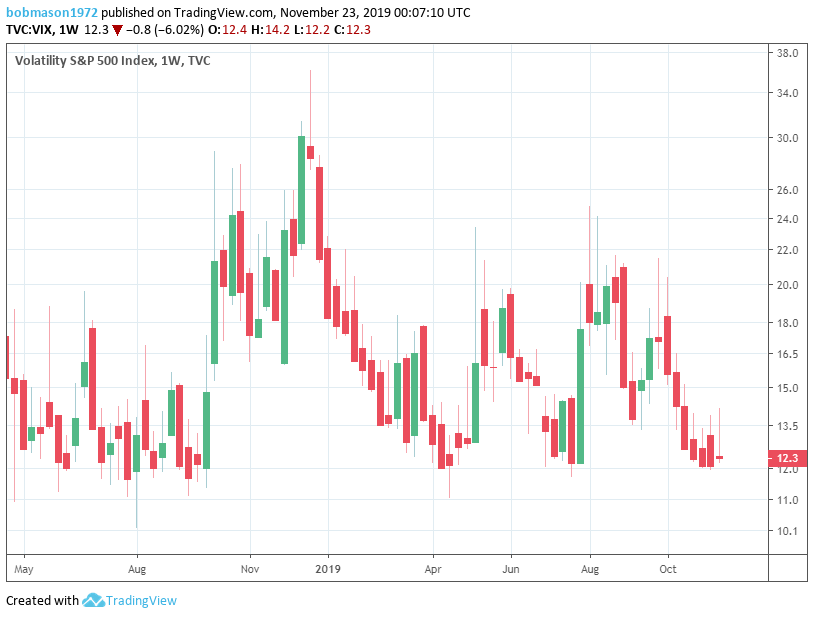European Equities: A Week in Review – 22/11/19
The Majors
It was a bearish week for the European majors, with the CAC40 falling by 0.78% to lead the way down. The DAX30 and Eurostoxx600 saw more modest losses of 0.59% and 0.51% respectively.
A positive end to the week was not enough to reverse losses from mid-week.
Economic data was in focus late in the week, as were U.S and China updates on trade.
The news was certainly mixed. Mid-week, risk aversion hit as news of Trump’s unwillingness to rollback tariffs questioned whether China would proceed. There were also the HK Bills that were voted through by the Senate and the House of Representatives. U.S support for HK protestors had led to a threat of retaliation from China.
At the end of the week, however, there was some positive news from Washington, with Trump announcing that a deal was close.
The Stats
It was a relatively busy week on the Eurozone economic calendar.
It was a quiet start to the week, however, with economic data limited to German wholesale inflation figures. The lack of stats had left the European majors in the hands of geopolitical risk going into a busy end to the week.
On Thursday, consumer confidence figures out of the Eurozone had a muted impact on the majors, in spite of a pickup in confidence. The Eurozone’s consumer confidence indicator rose from -7.6 to -7.2 in November, according to prelim figures. Economists had forecast a prelim -7.3.
It was a big day on Friday, however, with prelim November private sector PMIs from France, Germany and the Eurozone in focus.
The Eurozone’s Composite Output Index fell to a 2-month low 50.3, weighed by a 10-month low service sector PMI (51.5).
There was some support from the manufacturing sector, with a 3-month high Manufacturing PMI. The devil was in the details, however. A 3rd consecutive monthly decline in new orders for goods and services represented the worst spell since mid-2013. Optimism also sat well below levels from earlier in the year, with uncertainty over Brexit, trade and the threat of auto tariffs weighing.
Labour market conditions were also worsening, with employment growth falling for a 5th consecutive month and down to its lowest since January 2015.
On the monetary policy front, the ECB monetary policy meeting minutes on Thursday had a muted impact, as did Lagarde’s first speech as ECB President on Friday.
The Market Movers
From the DAX, it was another mixed week for the auto sector. Daimler bucked the trend in the week, rising by 3.11%, supported by a 1.98% rally on Friday. It was a bearish week for the rest of the sector, however. Volkswagen led the way down, sliding by 3.02%, with Continental down by 2.15%. BMW saw a more modest loss of 0.68% in the week.
It was a bullish week for the banking sector, however. Deutsche Bank rose by 1.21%, with Commerzbank up by 0.38%.
From the CAC, it was also a positive week for the banks. BNP Paribas rose by 1.82% to lead the way. Soc Gen and Credit Agricole rose by 0.58% and by 0.44% respectively.
The French auto sector took a hit in the week, however. Peugeot slid by 5.21%, with Renault falling by 0.71%.
On the VIX Index
The VIX Index rose by 2.41% in the week ending 22nd November. Reversing a 0.17% decline from the previous week, the VIX ended the week at 12.3.
The upside in the week came in spite of a 6% slide on Friday as the markets responded to positive updates from Washington on trade.
Economic data took a back seat in the week, with the markets eager for a Phase 1 agreement to be locked in before the year-end.

The Week Ahead
It’s a relatively busy week on the Eurozone economic calendar. At the start of the week, business and consumer confidence figures are due out of Germany on Monday and Tuesday.
We can expect the EUR to be particularly sensitive to the numbers. Reports of rising unemployment out of Germany had pressured consumer confidence recently.
The markets will then need to shift attention to stats at the end of the week. French consumer spending and GDP figures, and German and Eurozone unemployment figures are due out.
While consumer spending will provide direction, we would expect Germany’s unemployment figures to have the greatest influence on the day.
Any larger than expected rise in unemployment and expect the EUR to feel it.
Barring deviation from previous estimates, the French GDP figures should have a muted impact on the majors.
Throughout the week, prelim inflation figures from member states and the Eurozone are also unlikely to have a material impact.
From elsewhere, economic data from the U.S will also need monitoring. Consumer confidence figures on Tuesday and particularly busy Wednesday will provide direction.
Key stats on Wednesday include 3rd estimate GDP numbers, durable goods orders, and the FED’s preferred inflation figures.
It may ultimately come down to updates from Washington and Beijing on trade, however. Could this be the week when ink hits paper?
This article was originally posted on FX Empire

 Yahoo Finance
Yahoo Finance 